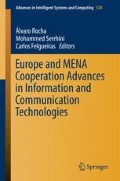Abstract
Over the last decade the mobile revolution has done the most fundamental changes to education, and as the fact that learning games are gradually having an increasing impact in Technology Enhanced Learning, we have suggested to combine the both approaches learning game “LG” and mobile learning called: “Mobile Game Based Learning” (MGBL). However there is a huge lack of authoring tool that facilitates the generation of an adaptive LG to multiple mobile devices, at the time when the features of mobile devices are increasingly evolved and the development cost are so expensive. To this end in this paper we present an extension of the chosen LG authoring tool also known as eAdventure, which aims to support an automatic adaptation of MGBL to multiple mobile devices platforms.
Access this chapter
Tax calculation will be finalised at checkout
Purchases are for personal use only
References
Katz, J.E.: Handbook of Mobile Communication Studies. The MIT Press (2008)
Jooste, T.: Mobile learning and social media: increasing engagement and interactivity. In: New Media Consortium Conference, pp. 9–12 (2010)
Chiou, C.-K., Tseng, J.C.R., Hwang, G.-J., Heller, S.: An adaptive navigation support system for conducting context-aware ubiquitous learning in museums. Comput. Educ. 55(2), 834–845 (2010)
Ogata, H., Matsuka, Y., El-Bishouty, M.M., Yano, Y.: Lorams: linking physical objects and videos for capturing and sharing learning experiences towards ubiquitous learning. Int. J. Mob. Learn. Organ. 3(4), 337–350 (2009)
Sandberg, J., Maris, M., de Geus, K.: Mobile english learning: an evidence-based study with fifth graders. Comput. Educ. 57(1), 1334–1347 (2011)
Lan, Y.-F., Sie, Y.-S.: Using rss to support mobile learning based on media richness theory. Comput. Educ. 55(2), 723–732 (2010)
Prensky, M.: Digital game-based learning. Comput. Entertainment (CIE) 1(1), 21–21 (2003)
Gee, J.P.: What video games have to teach us about learning and literacy. Comput. Entertainment (CIE) 1(1), 20–20 (2003)
Burgos, D., Tattersall, C., Koper, R.: Re-purposing existing generic games and simulations for e-learning. Comput. Hum. Behav. 23(6), 2656–2667 (2007)
Bennis, L., Benhlima, S.: Comparative study of the process model of serious game design through the generic model dice. In: Intelligent Systems and Computer Vision (ISCV), 2015, pp. 1–5. IEEE (2015)
Murray, T.: An overview of intelligent tutoring system authoring tools: updated analysis of the state of the art. In: Authoring Tools for Advanced Technology Learning Environments, pp. 491–544. Springer (2003)
Bastien, J.M.C., Scapin, D.L.: Ergonomic criteria for the evaluation of human-computer interfaces (1993)
Bach, C., Scapin, D.L.: Adaptation des critères ergonomiques aux interactions hommeenvironnements virtuels. IHM’2003-15ème Conférences Francophone sur l’Interaction Homme-Machine (2003)
Bennis, L., Benhlima, S., Bekri, M.A.: An authoring tool for generating an adaptive mobile game based learning
Bennis, L., Benhlima, S.: Building an Adaptive Game-Based Mobile Learning Using The Felder-Silverman Learning Style Model (FSLSM) Approach (2016)
Bennis, L., Benhlima, S.: A new approach to design an attractive game based learning in various domains. J. Theor. Appl. Inf. Technol. 85(3) (2016)
Acknowledgments
This research paper is made possible through the help and support from everyone, including:parents, teachers, family, friends, and in essence, all sentient beings. Especially, please allow me to dedicate my acknowledgment of gratitude toward the following significant advisors and contributors: First and foremost, I would like to thank Pr. Said Benhlima for his most support and encouragement. He kindly read my paper and offered invaluable detailed advices on grammar, organization, and the theme of the paper. Finally, I would like to thank Pr. M Ali bekri to read my paper and to provide valuable advices.
Author information
Authors and Affiliations
Corresponding author
Editor information
Editors and Affiliations
Rights and permissions
Copyright information
© 2017 Springer International Publishing AG
About this paper
Cite this paper
Bennis, L., Benhlima, S. (2017). Toward a New Approach: Extending a Game-Based Learning Authoring Tool eAdventure to Multiple Mobile Devices. In: Rocha, Á., Serrhini, M., Felgueiras, C. (eds) Europe and MENA Cooperation Advances in Information and Communication Technologies. Advances in Intelligent Systems and Computing, vol 520. Springer, Cham. https://doi.org/10.1007/978-3-319-46568-5_5
Download citation
DOI: https://doi.org/10.1007/978-3-319-46568-5_5
Published:
Publisher Name: Springer, Cham
Print ISBN: 978-3-319-46567-8
Online ISBN: 978-3-319-46568-5
eBook Packages: EngineeringEngineering (R0)

